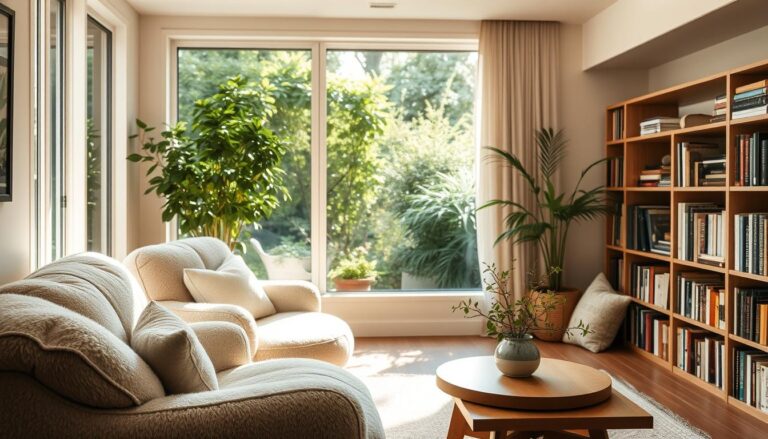Establishing a calming bedtime routine is crucial for a restful night’s sleep. In today’s fast-paced world, it’s easy to get caught up in the hustle and bustle, making it challenging to relax before bed.
A well-structured evening wind-down routine can help signal to your body that it’s time to sleep, promoting relaxation and reducing stress. By incorporating calming activities into your nightly routine, you can improve the quality of your sleep.
Key Takeaways
- Establishing a bedtime routine is crucial for a restful night’s sleep.
- A calming evening routine can help reduce stress and promote relaxation.
- Incorporating relaxing activities can improve sleep quality.
- A consistent sleep schedule is vital for overall well-being.
- Relaxation techniques can help calm the mind and body before sleep.
The Science Behind Evening Wind-Down Routines
The practice of unwinding in the evening is supported by a complex interplay of physiological processes that prepare the body for sleep. As the day comes to a close, our bodies begin to transition from a state of alertness to one of relaxation, a process that is crucial for achieving restful sleep.
How Your Body Prepares for Sleep
As evening approaches, the body starts to produce melatonin, a hormone that regulates sleep-wake cycles. This process is part of the body’s natural sleep hygiene, which is influenced by exposure to light and darkness. Creating a wind-down routine can support this natural process by signaling to the body that it’s time to sleep.
“A consistent sleep schedule and a relaxing bedtime routine can significantly improve sleep quality,” notes a study on sleep patterns. This emphasizes the importance of developing nighttime rituals that promote relaxation.
The Role of Circadian Rhythms
Circadian rhythms play a crucial role in determining our sleep-wake cycles. These internal processes respond to environmental cues, such as light and temperature, to synchronize our bodily functions with the 24-hour day-night cycle. Understanding and working with our circadian rhythms can enhance the effectiveness of our wind-down routines.
Why Consistency Matters for Sleep Quality
Consistency in our sleep schedules and bedtime routines is vital for maintaining good sleep quality. Irregular sleep patterns can disrupt the body’s natural rhythms, leading to stress relief challenges and decreased sleep quality. By establishing a consistent wind-down routine, individuals can better regulate their sleep and wake times, leading to improved overall well-being.
By understanding the physiological aspects of sleep preparation and the importance of consistency, we can better appreciate the value of a well-crafted evening wind-down routine.
Benefits of Establishing an Evening Wind-Down Routine for a Restful Night
Incorporating calming activities into your evening can lead to improved sleep quality and duration. A well-structured wind-down routine is essential for signaling to your body that it’s time to sleep, thereby enhancing the overall quality of your rest.
Improved Sleep Quality and Duration
A consistent evening routine helps regulate your body’s internal clock, leading to better sleep quality. This, in turn, can improve the duration of your sleep, ensuring you’re well-rested for the next day. Studies have shown that individuals who follow a bedtime routine sleep more soundly and wake up feeling more refreshed.
Reduced Stress and Anxiety Levels
Engaging in relaxing activities before bed, such as meditation or reading, can significantly reduce stress and anxiety levels. This calm state of mind is crucial for falling asleep quickly and sleeping soundly throughout the night.
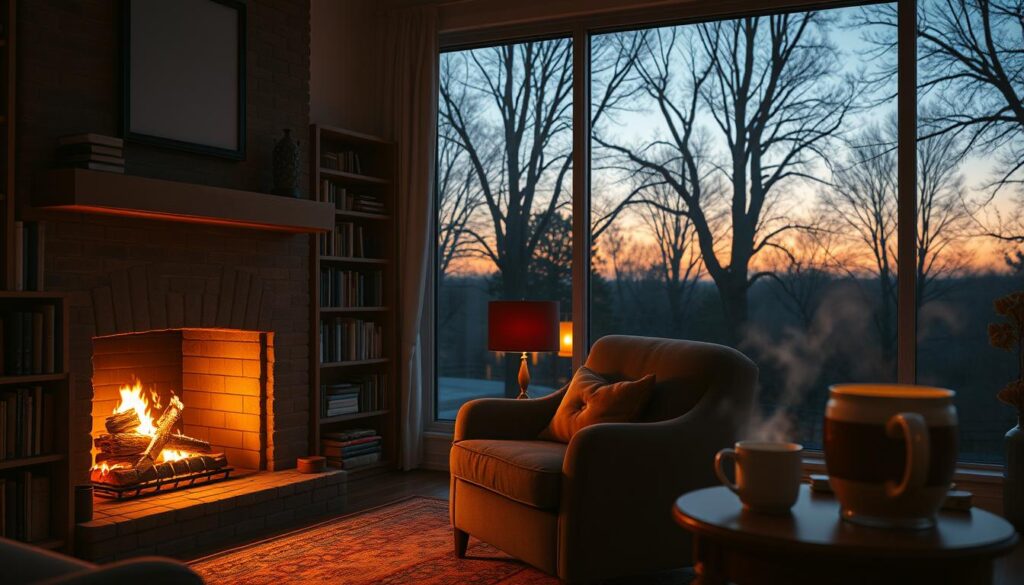
Enhanced Morning Energy and Productivity
Waking up after a restful night’s sleep can greatly enhance your morning energy levels. A consistent wind-down routine can lead to increased productivity throughout the day, as you’re more alert and focused.
Long-term Health Benefits
Establishing a peaceful evening routine can have long-term health benefits, including reduced risk of chronic diseases like diabetes and heart disease. A well-rested body is better equipped to handle the challenges of daily life, contributing to overall well-being.
| Benefits | Description |
|---|---|
| Improved Sleep Quality | Regulates body’s internal clock for better rest |
| Reduced Stress | Relaxing activities calm the mind before sleep |
| Enhanced Morning Energy | Increased productivity and alertness |
| Long-term Health Benefits | Reduced risk of chronic diseases |
By incorporating a peaceful evening routine into your daily schedule, you can experience these benefits firsthand, leading to a more balanced and healthy lifestyle.
Creating Your Personalized Wind-Down Timeline
To unwind effectively, it’s essential to create a personalized wind-down timeline. This involves understanding your sleep needs and crafting a routine that suits your lifestyle.
Determining Your Ideal Bedtime
Determining your ideal bedtime is the first step in creating a wind-down timeline. Consider your wake-up time and work backward to find a bedtime that allows for 7-9 hours of sleep. For instance, if you need to wake up at 6:00 AM, aim to be in bed by 10:00 PM to 11:30 PM.
Working Backward: When to Start Winding Down
Once you’ve established your ideal bedtime, work backward to determine when to start winding down. A general guideline is to begin winding down 30-60 minutes before bed. This allows time for relaxation techniques, such as reading or meditation, to help signal to your body that it’s time to sleep.
Here’s an example timeline:
| Activity | Time |
|---|---|
| Start winding down | 9:00 PM |
| Relaxation techniques | 9:15 PM |
| Prepare for bed | 9:45 PM |
| Sleep | 10:00 PM |
Adjusting for Weekends and Special Occasions
It’s also important to consider how to adjust your wind-down timeline for weekends and special occasions. While consistency is key, some flexibility can be beneficial. For example, you might allow yourself to sleep in a bit later on weekends, but still maintain a consistent wind-down routine.
Using Apps and Tools to Track Your Routine
Utilizing apps and tools can help you track your wind-down routine and stay consistent. Apps like Calm or Headspace offer guided relaxation techniques, while sleep tracking devices can monitor your sleep patterns. Consider using a sleep diary or a habit-tracking app to monitor your progress and make adjustments as needed.
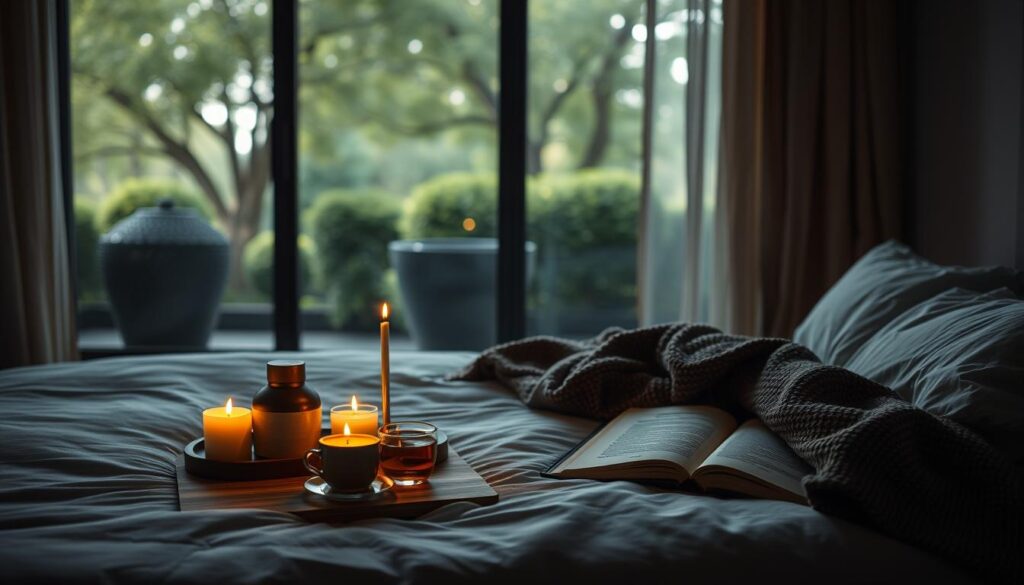
By creating a personalized wind-down timeline and using the right tools, you can improve your bedtime habits and enhance your overall relaxation experience.
Digital Detox: Managing Screen Time Before Bed
The glow of screens in the evening can significantly affect our ability to wind down and fall asleep. As we prepare for bed, it’s crucial to understand how screen time influences our sleep hygiene and overall nighttime rituals.
The Impact of Blue Light on Sleep Hormones
Exposure to blue light from smartphones, tablets, and computers can suppress the production of melatonin, the hormone responsible for regulating our sleep-wake cycles. This can lead to difficulty falling asleep and reduced sleep quality. Limiting screen time before bed is essential to minimize the disruptive effects of blue light on our sleep hormones.
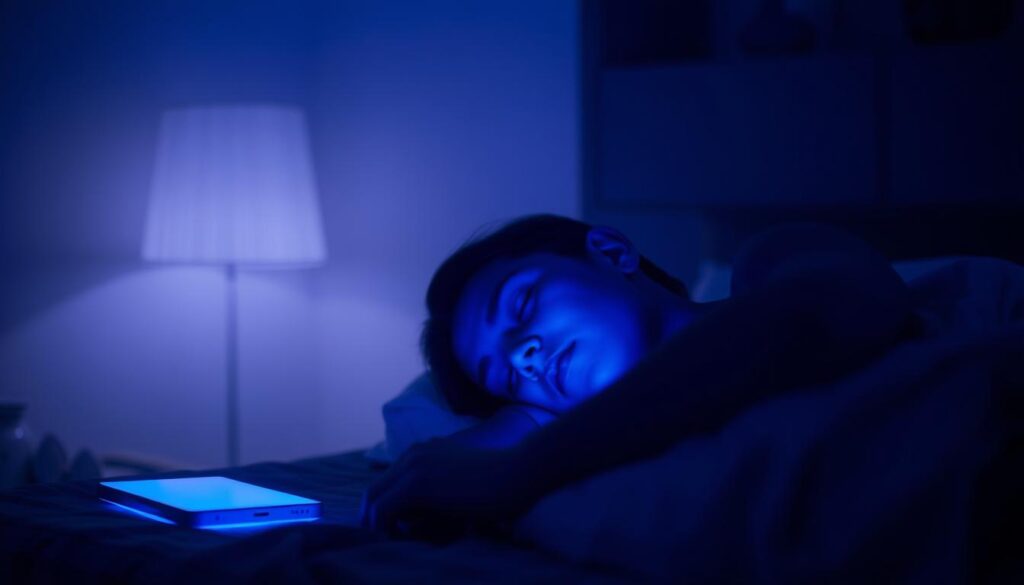
Setting Technology Boundaries and Notifications
Establishing technology boundaries is vital for improving sleep. This includes setting devices to “Do Not Disturb” mode, turning off notifications, and designating screen-free zones in the home. By doing so, we can reduce the temptation to check our devices before bed and create a more conducive sleep environment.
| Device Setting | Purpose | Benefit |
|---|---|---|
| Do Not Disturb | Silence notifications | Reduced distraction |
| Screen-free zone | Designate bed area as screen-free | Improved sleep hygiene |
| Blue light filtering | Reduce blue light emission | Less disruption to sleep hormones |
Screen-Free Alternatives for Evening Entertainment
Engaging in screen-free activities can be a great way to unwind before bed. Some alternatives include reading, journaling, or practicing gentle stretches. These activities can help signal to the body that it’s time to sleep and promote a restful night’s sleep.
Helpful Apps and Settings for Better Sleep
While it may seem counterintuitive, certain apps and device settings can help manage screen time and improve sleep. For example, apps that track sleep patterns and provide insights into sleep quality can be useful tools. Additionally, setting devices to grayscale mode can reduce the stimulating effects of screens before bed.
Calming Physical Activities for Your Evening Routine
As the day comes to a close, engaging in relaxing physical activities can help signal to your body that it’s time to wind down. Incorporating these activities into your evening routine can enhance your sleep quality and overall well-being.
Gentle Stretching and Yoga Poses for Better Sleep
Gentle stretching and yoga can be particularly beneficial in the evening. These practices help relax tense muscles, improve flexibility, and calm the mind. Certain yoga poses, such as Child’s Pose and Legs Up the Wall Pose, are especially effective for promoting relaxation.
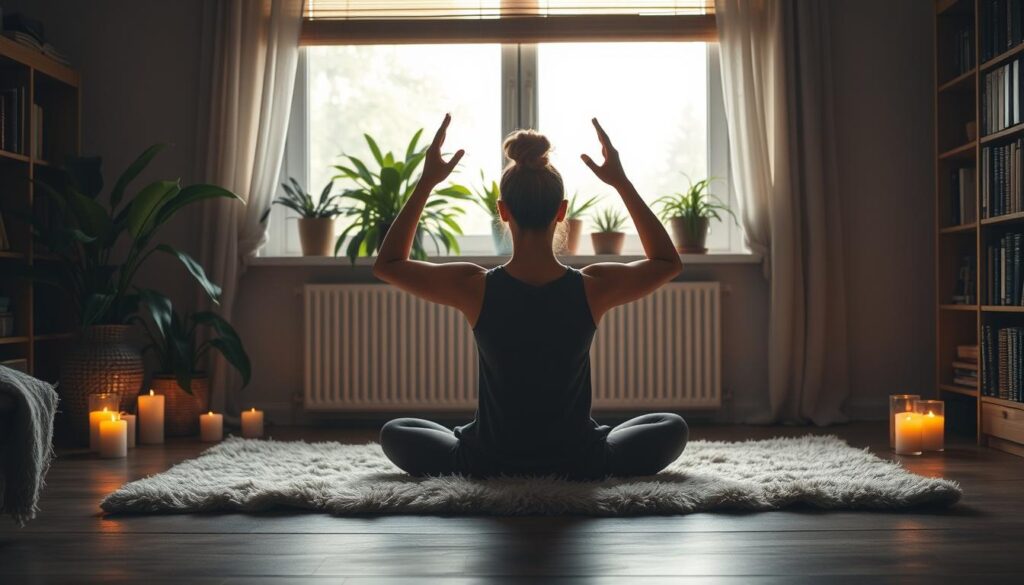
Evening Walks and Light Exercise Benefits
Taking a leisurely walk in the evening can be a great way to unwind. Light exercise, such as walking, can help reduce stress and anxiety without stimulating your body too much before bed. It’s also an excellent way to enjoy the outdoors and get some fresh air.
Relaxing Bath and Shower Rituals
A warm bath or shower can be a soothing end to the day. Adding essential oils like lavender to your bath water can enhance the relaxing experience. The key is to create a calming atmosphere that helps your body relax and prepares it for sleep.
Self-Massage Techniques for Tension Release
Self-massage is another effective way to release tension and relax your muscles. Simple techniques, such as gently massaging your temples or using a foam roller on your legs, can help alleviate stress and promote a sense of calm.
By incorporating these calming physical activities into your evening routine, you can create a peaceful transition to sleep, improving the quality of your rest and overall health.
Mindfulness and Relaxation Techniques
Mindfulness and relaxation techniques are essential components of a wind-down routine that promotes restful sleep. By incorporating these practices into your evening, you can calm your mind and prepare your body for a rejuvenating sleep.
Breathing Exercises for Better Sleep
Breathing exercises are a simple yet effective way to relax. Techniques such as diaphragmatic breathing can slow down your heart rate and calm your nervous system. To practice, place one hand on your belly and the other on your chest, inhaling deeply through your nose, allowing your belly to rise while your chest remains still.
Meditation Practices for Beginners
Meditation is a powerful tool for relaxation. For beginners, starting with guided meditation apps or videos can be helpful. Focus on your breath or a mantra, and gently bring your mind back when it wanders. Even a few minutes of meditation can make a significant difference in your sleep quality.
Progressive Muscle Relaxation Step-by-Step
Progressive muscle relaxation involves tensing and relaxing different muscle groups. Start with your toes and work your way up to your head, holding each muscle group for a few seconds before releasing. This technique can help release physical tension and promote relaxation.
Journaling and Gratitude Practices
Journaling before bed can help clear your mind and process your thoughts. Focusing on gratitude by writing down things you’re thankful for can shift your mindset to a more positive state, making it easier to fall asleep.
To illustrate the effectiveness of these techniques, consider the following comparison:
| Technique | Primary Benefit | Recommended Duration |
|---|---|---|
| Breathing Exercises | Reduces stress and anxiety | 5-10 minutes |
| Meditation | Improves mental clarity and calmness | 5-20 minutes |
| Progressive Muscle Relaxation | Relieves physical tension | 10-15 minutes |
| Journaling and Gratitude | Enhances mental well-being and positivity | 10-15 minutes |
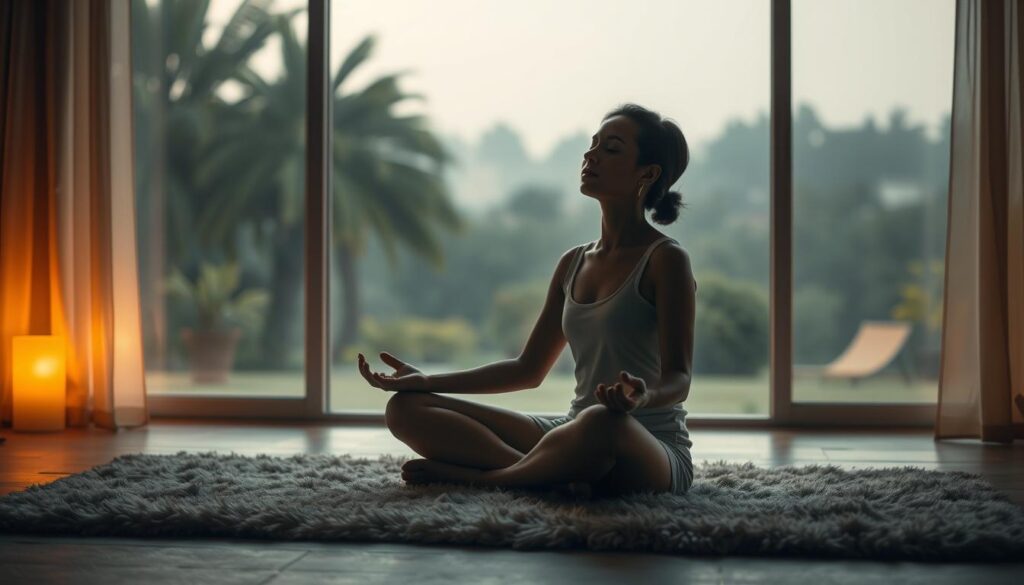
By incorporating these mindfulness and relaxation techniques into your evening routine, you can significantly improve your sleep quality and overall well-being.
Creating the Optimal Sleep Environment
Optimizing your sleep environment is essential for a peaceful evening routine. A well-designed bedroom can significantly improve the quality of your sleep, leading to better rest and recovery. Your bedroom should be a sanctuary that promotes relaxation and rejuvenation.
Temperature, Light, and Sound Considerations
A comfortable sleep environment starts with controlling temperature, light, and sound. Keeping your bedroom cool, around 60-67 degrees Fahrenheit, can promote better sleep. Darkness is also crucial; consider using blackout curtains or blinds to block out any light. For sound, you can use earplugs or a white noise machine to create a quiet atmosphere.
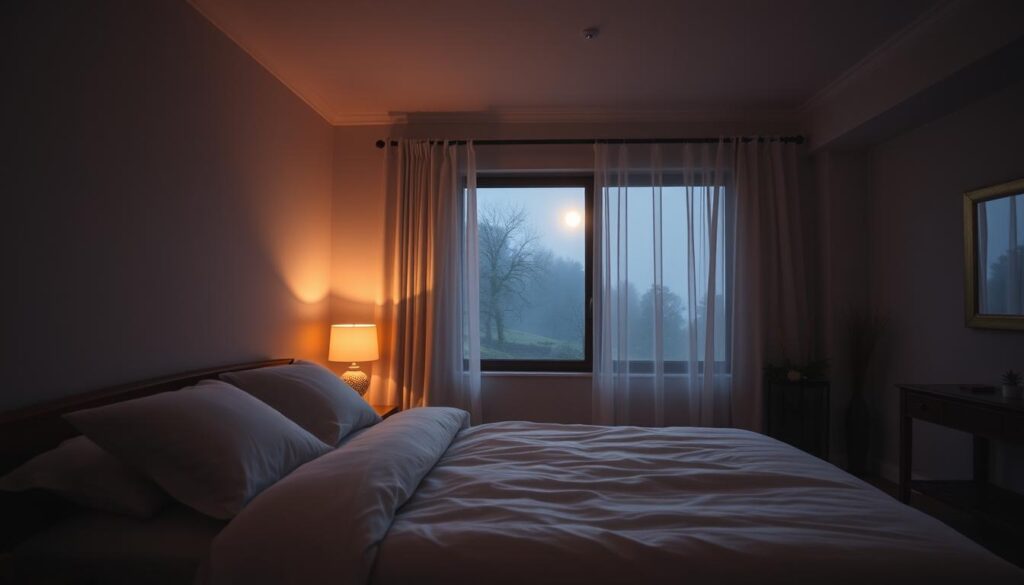
Bedding and Comfort Essentials
Investing in comfortable bedding is vital for a good night’s sleep. Choose a supportive mattress and comfortable pillows that suit your sleeping position. The right bedding can make a significant difference in your sleep quality.
Aromatherapy and Sleep-Promoting Scents
Aromatherapy can enhance your sleep environment. Certain scents like lavender and vanilla are known to promote relaxation and improve sleep quality. You can use essential oils in a diffuser or apply them to your bedding.
Organizing Your Bedroom for Peace of Mind
A clutter-free bedroom can contribute to a peaceful evening routine. Keeping your bedroom organized and tidy can help clear your mind and promote relaxation. Consider implementing storage solutions to keep your bedroom clutter-free.
By optimizing your sleep environment, you can significantly improve your bedtime habits and overall sleep experience.
Nutrition and Hydration for Better Sleep
Dietary choices have a profound effect on our sleep, making nutrition a vital aspect of sleep preparation. A well-balanced diet can significantly enhance sleep quality, while a poor diet can lead to sleep disturbances.
Evening Snacks That Promote Sleep
Consuming the right snacks in the evening can promote a restful night’s sleep. Foods rich in tryptophan, such as turkey and nuts, can help increase serotonin levels, promoting relaxation. Other sleep-friendly snacks include bananas, which are a good source of potassium, and cherries, which contain melatonin.
- Almonds
- Warm milk
- Cherries
- Bananas
Foods and Drinks to Avoid Before Bedtime
Just as some foods can promote sleep, others can hinder it. It’s advisable to avoid caffeine and alcohol close to bedtime, as they can disrupt sleep patterns. Additionally, heavy meals and spicy foods can cause discomfort and indigestion, making it harder to fall asleep.
Timing Your Last Meal and Beverages
The timing of your last meal and beverages can also impact sleep. Eating a large meal too close to bedtime can lead to poor sleep quality. It’s recommended to finish eating at least 2-3 hours before bedtime. Similarly, limiting fluid intake before bed can reduce the likelihood of waking up during the night to use the bathroom.
Herbal Teas and Natural Sleep Aids
Herbal teas, such as chamomile and lavender tea, can promote relaxation and improve sleep quality. Other natural sleep aids include melatonin supplements and valerian root. However, it’s essential to consult with a healthcare professional before adding any new supplements to your routine.
| Food/Drink | Effect on Sleep |
|---|---|
| Turkey | Promotes serotonin production |
| Caffeine | Disrupts sleep patterns |
| Chamomile Tea | Promotes relaxation |

Conclusion: Embracing Your Evening Wind-Down Journey
Establishing an evening wind-down routine is a simple yet effective way to improve the quality of your sleep and overall well-being. By incorporating relaxation techniques, such as gentle stretching, meditation, and deep breathing, you can signal to your body that it’s time to sleep, leading to a restful night’s rest.
As you’ve learned, creating a personalized wind-down timeline, managing screen time, and crafting a sleep-conducive environment are all crucial elements of an effective evening wind-down routine for a restful night. By implementing these strategies, you can wake up feeling refreshed, revitalized, and ready to take on the day.
Start your evening wind-down journey today and experience the benefits of relaxation and improved sleep quality. By making relaxation a priority, you can enjoy a better night’s sleep and a brighter tomorrow.


